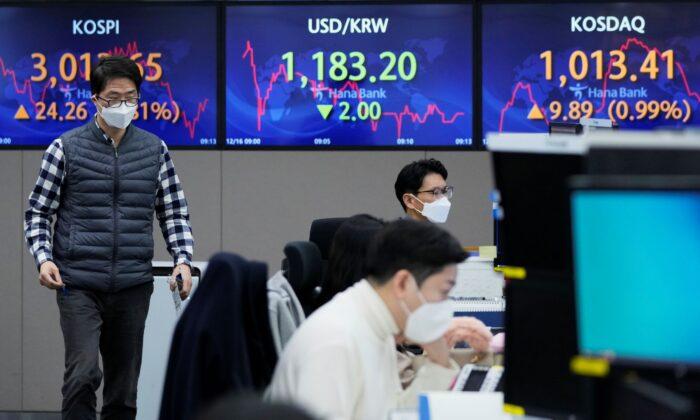Stocks have climbed in Europe and Asia, tracking Wall Street’s gains, after the Federal Reserve said it would accelerate its pullback of economic stimulus.
Shares surged in Paris, Frankfurt, London, and Tokyo. New York futures and oil prices also advanced.
The Fed said it would likely raise interest rates three times next year to tackle rising inflation and will shrink its monthly bond purchases at twice the pace it previously announced, in line with ending them altogether in March.
While the U.S. is hastening its efforts to counter inflation, analysts said central banks in Europe were not expected to follow suit.
Germany’s DAX surged 1.8 percent on Thursday to 15,751.98 and the CAC 40 in Paris rose 1.5 percent to 7,032.41. The FTSE 100 gained 1.1 percent to 7,247.49. The future for the S&P 500 was 0.6 percent higher while the contract for the Dow industrials gained 0.5 percent.
In Asian trading, Tokyo’s Nikkei 225 index rose 2.1 percent to 29,066.32 and the Kospi in South Korea picked up 0.6 percent to 3,006.41. The Shanghai Composite index added 0.8 percent to 3,675.02. India and Taiwan rose, while Sydney’s S&P/ASX 200 lost 0.4 percent to 7,295.70.
In Hong Kong, the Hang Seng clawed back from early losses, gaining 0.2 percent to 23,475.50.
Simmering tensions between Beijing and Washington are casting a shadow, analysts say, after the U.S. House of Representatives passed a resolution to ban imports from China’s Xinjiang region due to concerns about forced labor and other abuses.
The company’s Hong Kong traded shares dropped 5 percent on Thursday. They have declined nearly 22 percent in the past six months.
“Some concerns on potentially tougher sanctions from the U.S. have kept investors shunning, with China’s SMIC recently under U.S. scrutiny once again, and that may seem to cap gains for China tech sector today,” Yeap Jun Rong of IG said in a commentary.
While the U.S. is hastening its efforts to counter inflation, central banks in Europe are not expected to follow suit, analysts said.
“ECB doves are not set to budge,“ Mizuho Bank said in a market report. “For one, while economic recovery endures, it remains fragile, threatened by the ‘omicron' variant,” it said.
Germany is in the midst of its worst wave of infections so far. In Asia, South Korea has been struggling to beat back rising caseloads.
On Wednesday, major U.S. stock indexes rose after declining before the release of the Fed’s statement at 2 p.m. Eastern time. The S&P 500 rose 1.6 percent to 4,709.85, nearly recouping all of its losses for the week and ending just below the record high it set last Friday.
The Dow Jones Industrial Average rose 1.1 percent to 35,927.43 and the tech-heavy Nasdaq composite gained 2.2 percent to 15,565.58. The Russell 2000 index of smaller-company stocks rose 1.6 percent. Bond yields edged higher.
The U.S. central bank said its monthly bond purchases are no longer needed with unemployment falling and inflation at a near-40-year high. The accelerated timetable puts the Fed on a path to start raising rates as soon as the first half of next year.
The central bank’s policymakers had been expected to announce a faster pullback in their last meeting of the year.
Businesses have been dealing with supply chain problems and higher costs for months. It has been a key concern for investors as big companies pass those costs off to consumers, who have so far been absorbing higher prices on everything from groceries to clothing and other consumer products.
Bond investors had a more measured reaction to the Fed announcement. Bond yields edged higher, with the yield on the 10-year Treasury rising to 1.45 percent from 1.44 percent late Tuesday.
In other trading Thursday, U.S. crude oil climbed 66 cents to $71.53 per barrel in electronic trading on the New York Mercantile Exchange. It gained 14 cents to $70.87 per barrel on Wednesday.
Brent crude, the international basis for pricing, picked up 67 cents to $74.55 per barrel.
The U.S. dollar rose to 114.06 Japanese yen from 114.04 yen. The euro rose to $1.1319 from $1.1292.





